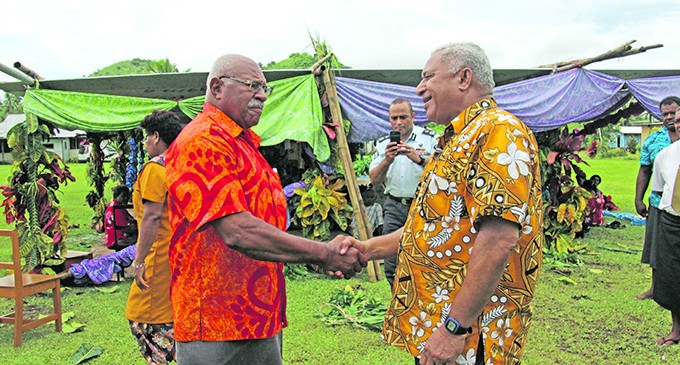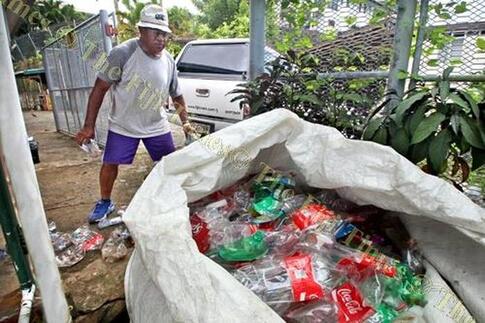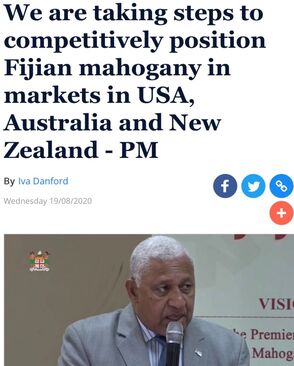Last month, the Fiji High Court in Suva threw out his claim and he had to pay court costs. He had loaned the money for a Mahogany Project
In the High Court of Fiji
At Suva
Civil Jurisdiction
Civil Action No. HBC 296 of 2017
Sitiveni Ligamamada Rabuka
Plaintiff
v
The Estate of the late Eroni Baleiwai Mavoa
First defendant
Emmaline Bui Mavoa
Second defendant
Bruce Rokosiga Ferguson
Third defendant
Counsel : Ms A. Vuki with Mr J. Lanyon for the plaintiff
Ms S. Nayacalevu with Mr V. Seduadua for the second and third defendants
Date of hearing: 7th and 8th November, 2019
Date of Judgment: 3rd July, 2020
Judgment
Funding will be to him from you but via me. That is, I will be personally responsible for the funds – its use and repayment. So the agreement will be between you and me. I hope this arrangement will be fine with you.(emphasis added)
Judge
3rd July,2020
At Suva
Civil Jurisdiction
Civil Action No. HBC 296 of 2017
Sitiveni Ligamamada Rabuka
Plaintiff
v
The Estate of the late Eroni Baleiwai Mavoa
First defendant
Emmaline Bui Mavoa
Second defendant
Bruce Rokosiga Ferguson
Third defendant
Counsel : Ms A. Vuki with Mr J. Lanyon for the plaintiff
Ms S. Nayacalevu with Mr V. Seduadua for the second and third defendants
Date of hearing: 7th and 8th November, 2019
Date of Judgment: 3rd July, 2020
Judgment
- The plaintiff (Rabuka] brings this claim against the defendants to recover the monies he loaned to the first defendant. The first defendant is the estate of the late Eroni Mavoa, (EM). The second defendant is his legal wife. The third defendant is a businessman trading as Kiodai Enterprise, (KE). The plaintiff obtained default judgment against the first defendant.
- The statement of claim states that KE “used to purchase, harvest, process and retail mahogany logs and timbers”. EM, acting as business investment collaborator for KE approached the plaintiff with a proposal to invest in the mahogany project of KE. The plaintiff agreed to the proposal. On 7th May, 2015, the first defendant provided a financing proposal, which outlined that the plaintiff’s initial loan of $70,000.00 would secure an annual return of $177,065.00. The plaintiff advanced the second loan of $98,000.00. He was paid interest for the total loan advanced. On 13th September, 2016, EM passed away. The second defendant has not taken out letters of administration.
- The second defendant in her statement of defence states that the plaintiff failed to make an application to appoint and bring an action against the personal representatives of the late EM. The institution of this action is a nullity. There are no assets to distribute in his estate. She is not in a position to take out letters of administration.
- The statement of defence of the third defendant states that KE is a solely owned enterprise of the third defendant. It was never in partnership with EM. EM had no authority to negotiate on behalf of KE. The third defendant was not a party and unaware of the loan agreement between the plaintiff and EM. EM advised the plaintiff that he was personally responsible for the funds invested.
- The question for determination is whether the second and third defendants are liable for the loan given by the plaintiff to the first defendant.
- The claim against the second defendant is made on the ground that she is the “legal wife and next of kin of the late (EM) and the person entitled to take out letters of administration for and on behalf of the 1st Defendant”.
- In my view, the second defendant is entitled to take out letters of administration of the estate. But that does not make her personally liable for the loan given to EM. The plaintiff, in cross examination agreed that she was neither involved in the transaction nor personally responsible for the debts of EM.
- In my judgment, the claim against the second defendant is misconceived and is declined.
- The case for the plaintiff is that he loaned monies to EM, the investment collaborator for the business of the third defendant trading as KE. It is alleged that EM represented KE. The third defendant denies the claim.
- The plaintiff, (PW1) in evidence in chief said that he paid the monies to EM. EM paid him interest. He signed an agreement with EM at a restaurant in the presence of its owner, Ms U. Fa. He did not have a copy of the agreement.
- PW2, (Ms U. Fa, Barrister and Solicitor) in her evidence said that she was asked by EM to peruse a loan agreement between the plaintiff and the first defendant and witnessed by the third defendant regarding a project for mahogany. She was present when it was signed. The agreement stated that EM was an agent for a company, but she could not recall the name of the company.
- The third defendant, (DW1) said that EM, his father in law) was never involved in his business. He did not have any discussion with the plaintiff nor authorize EM to make any representation. He was not involved in any mahogany project. He got angry when he read the email of 21st April, 2015, which referred to KE and himself.
- The plaintiff, in cross examination agreed that the averments in his statement of claim stating that he advanced monies to the third defendant were incorrect. EM, in his email to him of 21st April, 2015, and copied to the third defendant said that he will be personally responsible for the funds. There was no deal between him and the third defendant. He did not have any discussions with the third defendant on the transactions at any stage.
- In my judgment, the evidence reveals that there is no cause of action against the third defendant.
- I reproduce an excerpt from the email of 21st April, 2015, sent by EM to the plaintiff and copied to the third defendant:
Funding will be to him from you but via me. That is, I will be personally responsible for the funds – its use and repayment. So the agreement will be between you and me. I hope this arrangement will be fine with you.(emphasis added)
- It is clear from the words that I have highlighted that the first defendant was solely responsible for the loan provided.
- The action against the third defendant is declined.
- Order
- (a) The action against the second and third defendants is declined.
- (b) The plaintiff shall pay costs summarily assessed in a sum of $1500 to the second defendant and $1500 to the third defendant.
Judge
3rd July,2020
COUPISTS CHASING AFTER FIJI'S
GREEN GOLD - MAHOGANY
Prime Minister and Chairperson of the Fiji Mahogany Industry Council Voreqe Bainimarama says they are taking steps now to competitively position Fijian mahogany in markets like USA, Australia and New Zealand.
Bainimarama highlighted this while officiating as chief guest in the Fiji Mahogany Trust Annual Board Meeting. He says Fiji grows high quality mahogany, but without proper accreditation that quality does not guarantee growers anything where the market access is restricted and the price for timber is lower.
Bainimarama says some countries will not even purchase unaccredited hardwood at all. He says Fiji’s plantations need to be properly accredited and they are committed to seeing that happen. Bainimarama says some preliminary works have already begun.
The Prime Minister says the history of the mahogany industry is not all pretty as it is a long story marked by disappointment and scarred by corruption. He says with the money and machinery poured into the industry over the decades, Fijian mahogany should be a highly demanded global commodity, but it is not, as they are still paying for the many other missteps which includes the collapse of the Fiji Hardwood Corporation.
He says it is Fijian landowners and Fijian taxpayers who will suffer for that short-sightedness. Bainimarama says he does not need to emphasise the importance of long-term planning to anyone in the business of growing mahogany as it takes more than 25 years for a tree to reach full maturity so they know taking a view of the long-term is part of the very nature of this business.
He says the Fiji Mahogany Trust’s new small loan initiative is off to a promising start but surely landowners are building capacity and business acumen among landowners to seize ownership over the actual process of production, creating employment for people and saving costs on sub-contracting.
He says they must carefully monitor and audit those loans to ensure they are generating solid returns.
Bainimarama says they must achieve a level of transparency that shows them funding is being used efficiently.
Source: Fijivillage News
Bainimarama highlighted this while officiating as chief guest in the Fiji Mahogany Trust Annual Board Meeting. He says Fiji grows high quality mahogany, but without proper accreditation that quality does not guarantee growers anything where the market access is restricted and the price for timber is lower.
Bainimarama says some countries will not even purchase unaccredited hardwood at all. He says Fiji’s plantations need to be properly accredited and they are committed to seeing that happen. Bainimarama says some preliminary works have already begun.
The Prime Minister says the history of the mahogany industry is not all pretty as it is a long story marked by disappointment and scarred by corruption. He says with the money and machinery poured into the industry over the decades, Fijian mahogany should be a highly demanded global commodity, but it is not, as they are still paying for the many other missteps which includes the collapse of the Fiji Hardwood Corporation.
He says it is Fijian landowners and Fijian taxpayers who will suffer for that short-sightedness. Bainimarama says he does not need to emphasise the importance of long-term planning to anyone in the business of growing mahogany as it takes more than 25 years for a tree to reach full maturity so they know taking a view of the long-term is part of the very nature of this business.
He says the Fiji Mahogany Trust’s new small loan initiative is off to a promising start but surely landowners are building capacity and business acumen among landowners to seize ownership over the actual process of production, creating employment for people and saving costs on sub-contracting.
He says they must carefully monitor and audit those loans to ensure they are generating solid returns.
Bainimarama says they must achieve a level of transparency that shows them funding is being used efficiently.
Source: Fijivillage News






